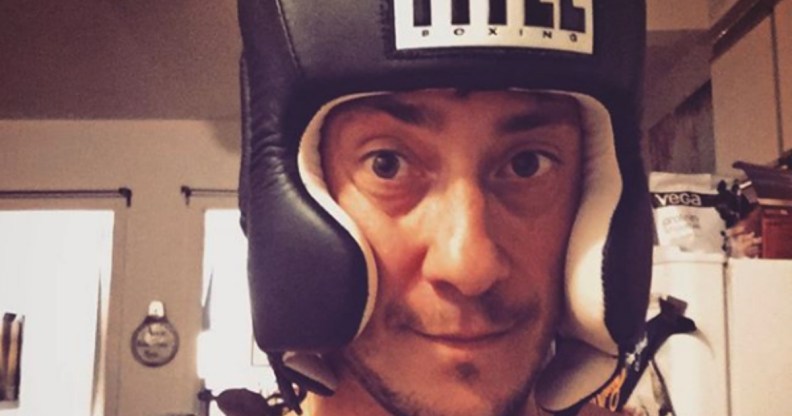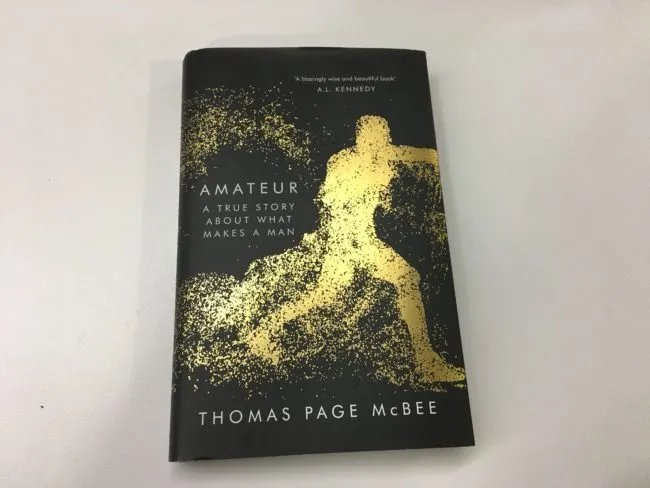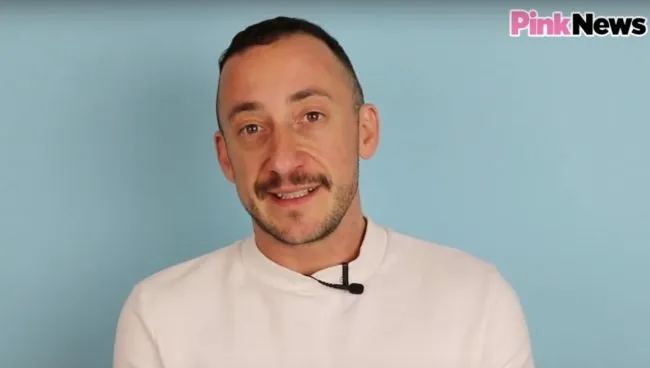What boxing taught a trans man about masculinity

Thomas Page McBee became the first trans man to box in Madison Square Garden in November 2015. (thomaspagemcbee/Instagram)
Thomas Page McBee, the first trans man to box in Madison Square Garden, pulls no punches on masculinity.
Ever since he began injecting testosterone at the age of 30 as part of his transitioning process, McBee has been wondering what drives men’s desire to fight.
Is testosterone to blame? Is there no escaping toxic masculinity?
Transitioning confronted McBee with all sorts of questions about being a man and forced him to face both the privileges and the constraints of his appearance.
“I was promoted more quickly, if I was in a meeting people would listen to me,” McBee tells PinkNews.
“If I was walking alone at night on the street I wasn’t afraid, and in fact I was someone who, if a woman was ahead of me on the street, she might be afraid of,” he says, describing this as an “unsettling and upsetting” experience.
Then there were the limitations. “My ability to express myself was suddenly being policed in really intense ways because men aren’t supposed to be vulnerable, men aren’t supposed to have empathy,” McBee says.
“Boxing gave me, a person who has never fully felt own-bodied, my first experience of actually totally being in my whole body.”
— Thomas Page McBee
McBee decided to use his position as a writer to face his own fears about masculinity and find out how to live authentically in his own body.
“I wanted to have an experience about being in my body and be a positive force in the world,” he says.
Partially inspired by the rising popularity of boxing classes among Wall Street workers, he decided to begin training for a charity boxing match and write about it in an article for Quartz, which formed the basis of a book detailing his experience, titled Amateur.
“Boxing was full of surprises,” McBee says. “Boxing gave me, a person who has never fully felt own-bodied, my first experience of actually totally being in my whole body. I could just completely have a relationship with my own body I never had before.”
And so, after months of strenuous training, McBee became the first trans man to fight in a ring at New York’s iconic venue, Madison Square Garden.
“We live in cultures where being violent gives you status, that’s why men are violent.”
— Thomas Page McBee
“Obviously it’s thrilling and exciting—it’s not why I did it but it’s a very cool honour,” McBee says.
“When you are a 37-year-old trans man, kind of strangely, you end up being the first in a lot of things, which is so weird. I can’t wait actually to not be the first.
“There’s very few people that are trans men and women older than me and that’s sad. The reasons there are few of us have to do with suicide, murder, so many terrible things.
“I can’t wait for all the firsts to be done and for all the things trans people will be doing in a generation or two,” he says.

McBee wrote about boxing in an article for Quartz which formed the basis of the book Amateur, which narrates his journey to understanding masculinity and what makes it toxic.
McBee is also one of the most visible and vocal trans men in the US when it comes to the entertainment industry.
He was recently hired to work on Netflix’s upcoming Tales of the City revival—the only trans writer on the team of a show that is expected to break new ground for transgender representation on screen.
He was also one of the 42 trans and non-binary people featured in British Vogue’s We Won’t Be Erased short film, named after the slogan protesting the Trump administration’s anti-transgender policies.
The crisis of masculinity is a swindling tornado
The election of Donald Trump looms largely over McBee’s book as the embodiment of the masculinity crisis that the author, and various researchers, had been observing for years.
“Masculinity study folks have been talking about a masculinity crisis since the 90s. This is something they saw coming,” McBee says, describing the crisis less as a linear timeline and more like a swirling tornado “that has been gathering energy and is now obliterating things and sort of created this massive destruction.”
“It’s hard to make anything a binary. I live a paradox.”
— Thomas Page McBee
Masculinity, like testosterone, is not inherently aggressive. McBee cites Stanford University professor Robert Sapolsky, a neuroendocrinologist, in describing testosterone as prompting men to seek status, rather than violence.
“We live in cultures where being violent gives you status, that’s why men are violent,” McBee says, quoting economic games where being co-operative was the goal showing that men with the highest testosterone levels were the ones who won the game repeatedly.
“But if the gave a man a placebo shot and told him it was testosterone, he would become aggressive immediately,” he continues. “People don’t see the underlying problem, which is the way we have been constructing an entire identity.”
Overcoming the masculinity-femininity binary
As a paper by New York University PhD student Sarah DiMuccio quoted in McBee’s Amateur indicated, Americans construct the idea of “being a man” in opposition to that of being a woman—in Denmark, however, “being a man” meant not being a boy.
“It’s hard to make anything a binary. I live a paradox,” McBee says. “I know gender is constructed, I understand that and I also know I’m transgender, I have gender dysphoria, that was a real thing for me and I had to do something physically to make myself be able to live.”
He compares the expression of gender identity to the way some couples decide what traditions to enact at their weddings.
“What traditions do we want to keep, which ones are a little problematic but I’m kind of OK with? That process we do in our lives in all sorts of ways, can also be applied to gender.”

McBee is the only trans writer working on Netflix’s upcoming Tales of the City revival.
Those who oppose the deconstruction of traditional notions of masculinity and femininity are missing out on an opportunity, McBee says.
“Instead of seeing a possibility for yourself, your reaction is to become threatened and double down on your sense of identity, and therefore you’re interpreting it as a threat to you—all of this is a ‘you’ problem. None of this is a ‘me’ problem,” he says.
As for his understanding of masculinity, McBee’s journey as a boxer and as a writer has led him to space where he is comfortable in his body and with his masculinity.
He lost the charity fight in Madison Square Garden, but it did not feel like a defeat.
“I didn’t win but I won,” he wrote on Instagram after the match, sharing a picture of him raising his fist in the air.

